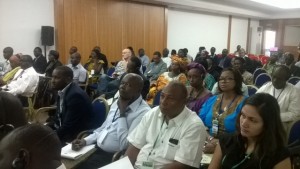Side Session Summary: Scaling Up Hygiene: A PPPHW event at AfricaSan4
Published: June 4, 2015 / Published by Global Handwashing Partnership, Sanitation and Hygiene Applied Research for Equity, UNICEF, Unilever and the London School of Hygiene and Tropical Medicine

As a follow-up discussion to our Regional Think Tank at AfricaSan4, we hosted a session examining the challenges of bringing hygiene improvement to scale.
In this session we presented three components of scaling up: policy, partnerships, and integration. Katie Greenland (LSHTM) presented the equity argument for scaling up handwashing; Anila Gopal (Unilever) shared how Unilever scaled up their handwashing program to reach 254 million people; Ousmane Toure (National Institute for Research in Public Health, Mali) discussed how a food hygiene program in Mali was scaled up to other countries; Chimwemwe Nyimba (UNICEF Malawi) described the successful integration of handwashing into CLTS (you can read more about the program on this field note), and finally Hanna Woodburn (PPPHW) addressed how the Sustainable Development Goals have the potential to help scale up handwashing by driving government commitment, monitoring, and reporting.
The following presentations are available for download:
Why we need to scale up hygiene, Katie Greenland (LSHTM)
Hygiene intervention reduces contamination of weaning food, Ousmane Toure (Head, Department of Community Health, Mali) Also available in French
Moving effective hygiene improvement to scale through policymaking Chimwemwe Nyimba (UNICEF)
Moving hygiene improvement to scale through policymaking, Hanna Woodburn (PPPHW)
- Resource Attachments:
- https://globalhandwashing.org/wp-content/uploads/2015/06/why-we-need-to-scale-up-hygiene-ppphw-post-africa-san-4-side-session.pdf (pdf)
- https://globalhandwashing.org/wp-content/uploads/2015/06/hygiene-reduces-contamination-of-weaning-foods-post-africa-san-4.pdf (pdf)
- https://globalhandwashing.org/wp-content/uploads/2015/06/hygiene-reduces-contamination-of-weaning-foods-post-africa-san-4-FR.pdf (pdf)
- https://globalhandwashing.org/wp-content/uploads/2015/06/movign-effective-hygiene-to-scale-post-africa-san-4-unicef.pdf (pdf)
- https://globalhandwashing.org/wp-content/uploads/2015/06/movign-hygiene-improvement-to-scale-through-policy-making-post-africa-san-4.pdf (pdf)
TAGS: Briefing PaperPresentation Advocacy & Policy ImplementersAcademicsAdvocates EnglishFrench 2015